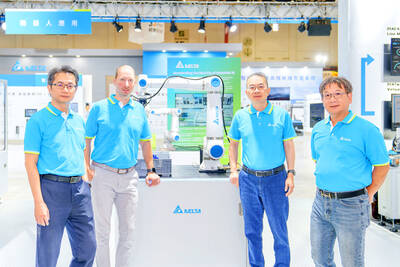Ericsson AB ousted chief executive officer Hans Vestberg after its shares slumped, competition intensified and the maker of wireless networking equipment faced investigations into its business dealings in Europe and Asia.
Vestberg, who was CEO for six-and-a-half years, stepped down immediately, according to an Ericsson statement yesterday. Chief financial officer Jan Frykhammar is to take over as CEO until a replacement is found.
“In the current environment and as the company accelerates its strategy execution, the board of directors has decided that the time is right for a new leader to drive the next phase in Ericsson’s development,” the company said.
Vestberg’s departure caps a turbulent period for Ericsson, which is cutting jobs while battling fierce competition from Huawei Technologies Co (華為) and Nokia Oyj. The company said last week it would accelerate cost cuts after reporting disappointing results.
Vestberg has faced questions on probes into alleged corruption in Asia and Europe, and last week the company rejected a report in Swedish media that it might be inflating sales by booking revenue before some clients are invoiced.
Ericsson shares yesterday advanced as much as 5.9 percent on the news. The stock was up 5 percent to 66.55 kronor at 9:28am in Stockhom.
The shares lost about 4 percent during Vestberg’s tenure, compared with a more than 90 percent gain for the STOXX 600 technology index.
With much of the 4G networks already built in the US and China, Vestberg had vowed to improve profitability, but the stock has declined since reaching a more than seven-year high in April last year.
Vestberg had carved out new business units targeting media and enterprise customers to get back to growth, while investing in next generation 5G wireless technology, which represents the next wave of spending at Ericsson’s telecom customers. However, he refrained from big, dramatic moves such as Nokia’s purchase of Alcatel-Lucent SA, opting instead for a partnership with Cisco Systems Inc for Internet products such as routers.
A new CEO could potentially shift the product strategy and be more aggressive about mergers and acquisitions, Kepler Cheuvreux analyst Sebastien Sztabowicz said in a research note.
Nokia and Huawei “have both engaged toward an end-to-end products portfolio strategy,” he said.
Vestberg, a career Ericsson manager who joined the company straight out of business school in 1991, headed its global service division from 2003 to 2007 after having held various company positions in China, Sweden, Chile and Brazil. He was named chief financial officer in October 2007 and replaced Carl-Henric Svanberg as CEO at the start of 2010.
Earlier this year, Ericsson’s second-biggest shareholder, Industrivaerden AB, was unusually candid in its critique of the mobile network manufacturer, saying its shares had underperformed in the face of market changes.
Through vote-heavy A shares, Industrivaerden and its associate, Svenska Handelsbanken AB, control more than 42 percent of the votes in Ericsson together with largest shareholder Investor AB, the holding company of Sweden’s Wallenberg family.
“They needed something to happen,” Swedbank AB analyst Mathias Lundberg said in Stockholm.

SETBACK: Apple’s India iPhone push has been disrupted after Foxconn recalled hundreds of Chinese engineers, amid Beijing’s attempts to curb tech transfers Apple Inc assembly partner Hon Hai Precision Industry Co (鴻海精密), also known internationally as Foxconn Technology Group (富士康科技集團), has recalled about 300 Chinese engineers from a factory in India, the latest setback for the iPhone maker’s push to rapidly expand in the country. The extraction of Chinese workers from the factory of Yuzhan Technology (India) Private Ltd, a Hon Hai component unit, in southern Tamil Nadu state, is the second such move in a few months. The company has started flying in Taiwanese engineers to replace staff leaving, people familiar with the matter said, asking not to be named, as the

The prices of gasoline and diesel at domestic fuel stations are to rise NT$0.1 and NT$0.4 per liter this week respectively, after international crude oil prices rose last week, CPC Corp, Taiwan (台灣中油) and Formosa Petrochemical Corp (台塑石化) announced yesterday. Effective today, gasoline prices at CPC and Formosa stations are to rise to NT$27.3, NT$28.8 and NT$30.8 per liter for 92, 95 and 98-octane unleaded gasoline respectively, the companies said in separate statements. The price of premium diesel is to rise to NT$26.2 per liter at CPC stations and NT$26 at Formosa pumps, they said. The announcements came after international crude oil prices

STABLE DEMAND: Delta supplies US clients in the aerospace, defense and machinery segments, and expects second-half sales to be similar to the first half Delta Electronics Inc (台達電) expects its US automation business to remain steady in the second half, with no signs of weakening client demand. With demand from US clients remaining solid, its performance in the second half is expected to be similar to that of the first half, Andy Liu (劉佳容), general manager of the company’s industrial automation business group, said on the sidelines of the Taiwan Automation Intelligence and Robot Show in Taipei on Wednesday. The company earlier reported that revenue from its automation business grew 7 percent year-on-year to NT$27.22 billion (US$889.98 million) in the first half, accounting for 11 percent

A German company is putting used electric vehicle batteries to new use by stacking them into fridge-size units that homes and businesses can use to store their excess solar and wind energy. This week, the company Voltfang — which means “catching volts” — opened its first industrial site in Aachen, Germany, near the Belgian and Dutch borders. With about 100 staff, Voltfang says it is the biggest facility of its kind in Europe in the budding sector of refurbishing lithium-ion batteries. Its CEO David Oudsandji hopes it would help Europe’s biggest economy ween itself off fossil fuels and increasingly rely on climate-friendly renewables. While